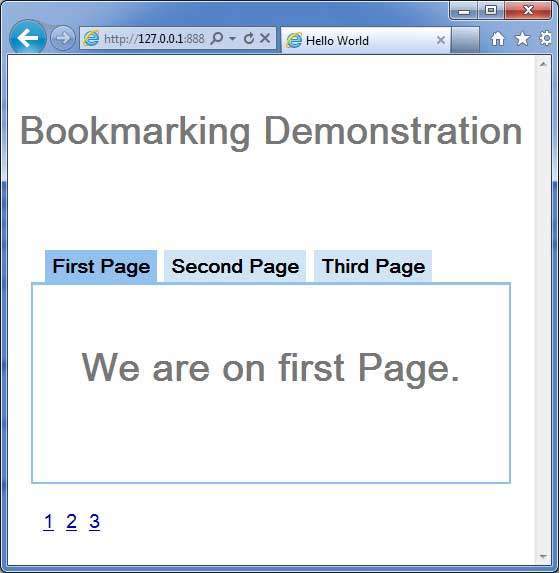GWT - การสนับสนุนบุ๊กมาร์ก
GWT รองรับการจัดการประวัติเบราว์เซอร์โดยใช้คลาสประวัติซึ่งคุณสามารถอ้างอิงGWT -บทคลาสประวัติศาสตร์
GWT ใช้คำ tokenซึ่งเป็นเพียงสตริงที่แอปพลิเคชันสามารถแยกวิเคราะห์เพื่อกลับไปยังสถานะเฉพาะ แอปพลิเคชันจะบันทึกโทเค็นนี้ในประวัติของเบราว์เซอร์เป็นส่วนย่อยของ URL
ในGWT -บทคลาสประวัติศาสตร์เราจัดการการสร้างโทเค็นและการตั้งค่าในประวัติโดยการเขียนโค้ด
ในบทความนี้เราจะพูดถึงวิดเจ็ตพิเศษไฮเปอร์ลิงก์ซึ่งสร้างโทเค็นและจัดการประวัติให้เราโดยอัตโนมัติและให้ความสามารถในการบุ๊กมาร์กของแอปพลิเคชัน
ตัวอย่างการบุ๊กมาร์ก
ตัวอย่างนี้จะนำคุณผ่านขั้นตอนง่ายๆในการสาธิตการบุ๊กมาร์กของแอปพลิเคชัน GWT
ขั้นตอนต่อไปนี้เพื่ออัปเดตแอปพลิเคชัน GWT ที่เราสร้างในGWT - สร้างบทแอปพลิเคชัน -
| ขั้นตอน | คำอธิบาย |
|---|---|
| 1 | สร้างโครงการที่มีชื่อHelloWorldภายใต้แพคเกจcom.tutorialspointตามที่อธิบายไว้ในGWT - สร้างแอพลิเคชันบท |
| 2 | แก้ไขHelloWorld.gwt.xml , HelloWorld.css , HelloWorld.htmlและHelloWorld.javaตามที่อธิบายด้านล่าง เก็บไฟล์ที่เหลือไว้ไม่เปลี่ยนแปลง |
| 3 | คอมไพล์และเรียกใช้แอปพลิเคชันเพื่อตรวจสอบผลลัพธ์ของตรรกะที่ใช้งาน |
ต่อไปนี้เป็นเนื้อหาของตัวอธิบายโมดูลที่แก้ไข src/com.tutorialspoint/HelloWorld.gwt.xml.
<?xml version = "1.0" encoding = "UTF-8"?>
<module rename-to = 'helloworld'>
<!-- Inherit the core Web Toolkit stuff. -->
<inherits name = 'com.google.gwt.user.User'/>
<!-- Inherit the default GWT style sheet. -->
<inherits name = 'com.google.gwt.user.theme.clean.Clean'/>
<!-- Specify the app entry point class. -->
<entry-point class = 'com.tutorialspoint.client.HelloWorld'/>
<!-- Specify the paths for translatable code -->
<source path = 'client'/>
<source path = 'shared'/>
</module>ต่อไปนี้เป็นเนื้อหาของไฟล์ Style Sheet ที่แก้ไข war/HelloWorld.css.
body {
text-align: center;
font-family: verdana, sans-serif;
}
h1 {
font-size: 2em;
font-weight: bold;
color: #777777;
margin: 40px 0px 70px;
text-align: center;
}ต่อไปนี้เป็นเนื้อหาของไฟล์โฮสต์ HTML ที่แก้ไข war/HelloWorld.html
<html>
<head>
<title>Hello World</title>
<link rel = "stylesheet" href = "HelloWorld.css"/>
<script language = "javascript" src = "helloworld/helloworld.nocache.js">
</script>
</head>
<body>
<iframe src = "javascript:''"id = "__gwt_historyFrame"
style = "width:0;height:0;border:0"></iframe>
<h1> Bookmarking Demonstration</h1>
<div id = "gwtContainer"></div>
</body>
</html>ให้เรามีเนื้อหาต่อไปนี้ของไฟล์ Java src/com.tutorialspoint/HelloWorld.java ซึ่งเราจะสาธิตการทำบุ๊กมาร์กในรหัส GWT
package com.tutorialspoint.client;
import com.google.gwt.core.client.EntryPoint;
import com.google.gwt.event.logical.shared.ValueChangeEvent;
import com.google.gwt.event.logical.shared.ValueChangeHandler;
import com.google.gwt.user.client.History;
import com.google.gwt.user.client.ui.HTML;
import com.google.gwt.user.client.ui.HorizontalPanel;
import com.google.gwt.user.client.ui.Hyperlink;
import com.google.gwt.user.client.ui.RootPanel;
import com.google.gwt.user.client.ui.TabPanel;
import com.google.gwt.user.client.ui.VerticalPanel;
public class HelloWorld implements EntryPoint {
private TabPanel tabPanel;
private void selectTab(String historyToken){
/* parse the history token */
try {
if (historyToken.substring(0, 9).equals("pageIndex")) {
String tabIndexToken = historyToken.substring(9, 10);
int tabIndex = Integer.parseInt(tabIndexToken);
/* Select the specified tab panel */
tabPanel.selectTab(tabIndex);
} else {
tabPanel.selectTab(0);
}
} catch (IndexOutOfBoundsException e) {
tabPanel.selectTab(0);
}
}
/**
* This is the entry point method.
*/
public void onModuleLoad() {
/* create a tab panel to carry multiple pages */
tabPanel = new TabPanel();
/* create pages */
HTML firstPage = new HTML("<h1>We are on first Page.</h1>");
HTML secondPage = new HTML("<h1>We are on second Page.</h1>");
HTML thirdPage = new HTML("<h1>We are on third Page.</h1>");
String firstPageTitle = "First Page";
String secondPageTitle = "Second Page";
String thirdPageTitle = "Third Page";
Hyperlink firstPageLink = new Hyperlink("1", "pageIndex0");
Hyperlink secondPageLink = new Hyperlink("2", "pageIndex1");
Hyperlink thirdPageLink = new Hyperlink("3", "pageIndex2");
HorizontalPanel linksHPanel = new HorizontalPanel();
linksHPanel.setSpacing(10);
linksHPanel.add(firstPageLink);
linksHPanel.add(secondPageLink);
linksHPanel.add(thirdPageLink);
/* If the application starts with no history token,
redirect to a pageIndex0 */
String initToken = History.getToken();
if (initToken.length() == 0) {
History.newItem("pageIndex0");
initToken = "pageIndex0";
}
tabPanel.setWidth("400");
/* add pages to tabPanel*/
tabPanel.add(firstPage, firstPageTitle);
tabPanel.add(secondPage,secondPageTitle);
tabPanel.add(thirdPage, thirdPageTitle);
/* add value change handler to History
* this method will be called, when browser's Back button
* or Forward button are clicked.
* and URL of application changes.
* */
History.addValueChangeHandler(new ValueChangeHandler<String>() {
@Override
public void onValueChange(ValueChangeEvent<String> event) {
selectTab(event.getValue());
}
});
selectTab(initToken);
VerticalPanel vPanel = new VerticalPanel();
vPanel.setSpacing(10);
vPanel.add(tabPanel);
vPanel.add(linksHPanel);
/* add controls to RootPanel */
RootPanel.get().add(vPanel);
}
}เมื่อคุณพร้อมกับการเปลี่ยนแปลงทั้งหมดแล้วให้เรารวบรวมและเรียกใช้แอปพลิเคชันในโหมดการพัฒนาเหมือนที่เราทำในGWT - สร้างบทแอปพลิเคชัน หากทุกอย่างเรียบร้อยกับแอปพลิเคชันของคุณสิ่งนี้จะให้ผลลัพธ์ดังต่อไปนี้ -

ตอนนี้คลิกที่ 1, 2 หรือ 3 คุณจะสังเกตได้ว่าแท็บเปลี่ยนไปตามดัชนี
คุณควรสังเกตเมื่อคุณคลิกที่ 1,2 หรือ 3 url ของแอปพลิเคชันจะเปลี่ยนไปและ #pageIndex จะถูกเพิ่มลงใน url
นอกจากนี้คุณยังสามารถเห็นว่าปุ่มย้อนกลับและไปข้างหน้าของเบราว์เซอร์เปิดใช้งานอยู่
ใช้ปุ่มย้อนกลับและไปข้างหน้าของเบราว์เซอร์และคุณจะเห็นแท็บต่างๆที่ได้รับเลือกตามนั้น
คลิกขวาที่ 1, 2 หรือ 3 คุณจะเห็นตัวเลือกต่างๆเช่นเปิดเปิดในหน้าต่างใหม่เปิดในแท็บใหม่เพิ่มรายการโปรดเป็นต้น
คลิกขวาที่ 3 เลือกเพิ่มในรายการโปรด บันทึกบุ๊กมาร์กเป็นหน้า 3
เปิดรายการโปรดและเลือกหน้า 3 คุณจะเห็นแท็บที่สามที่เลือก